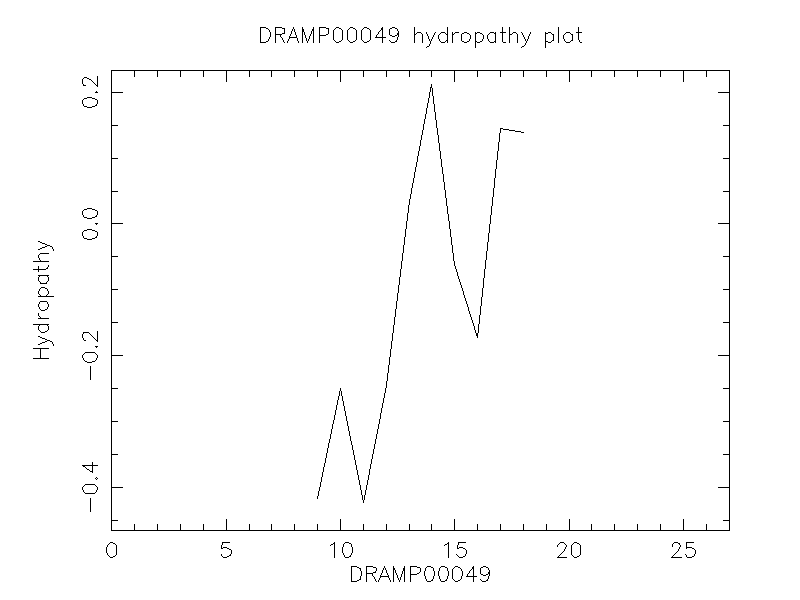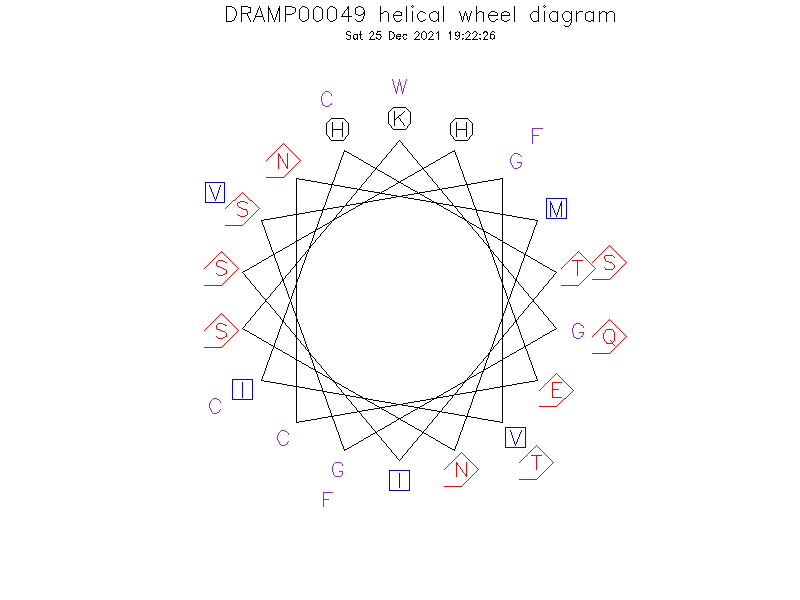General Information
-
DRAMP ID
- DRAMP00049
-
Peptide Name
- Bacteriocin lacticin-481 (Lactococcin-DR)
-
Source
- Lactococcus lactis CNRZ 481 (Gram-positive bacteria)
-
Family
- Belongs to the type A lantibiotic family (Class I bacteriocin)
-
Gene
- lctA
-
Sequence
- KGGSGVIHTISHECNMNSWQFVFTCCS
-
Sequence Length
- 27
-
UniProt Entry
- P36499
-
Protein Existence
- Protein level
Activity Information
-
Biological Activity
- Antimicrobial, Antibacterial, Anti-Gram+
-
Target Organism
-
- Gram-positive bacteria: Lactic acid bacteria, Clostridium tyrobutyricum.
-
Hemolytic Activity
-
- No hemolysis information or data found in the reference(s) presented in this entry
-
Cytotoxicity
-
- Not included yet
-
Binding Target
- Cell membrane
Structure Information
-
Linear/Cyclic
- Not included yet
-
N-terminal Modification
- Not included yet
-
C-terminal Modification
- Not included yet
-
Nonterminal Modifications and Unusual Amino Acids
- Not included yet
-
Stereochemistry
- Not included yet
-
Structure
- Not found
-
Structure Description
- Not found
-
Helical Wheel Diagram
-
PDB ID
- None
-
Predicted Structure
- There is no predicted structure for DRAMP00049.
Physicochemical Information
-
Formula
- C127H190N36O39S4
Absent Amino Acids
- ADLPRY
Common Amino Acids
- S
Mass
- 2973.36
PI
- 6.89
Basic Residues
- 3
Acidic Residues
- 1
Hydrophobic Residues
- 7
Net Charge
- +2
-
Boman Index
- -24.02
Hydrophobicity
- 0.052
Aliphatic Index
- 50.37
Half Life
-
- Mammalian:1.3 hour
- Yeast:3 min
- E.coli:2 min
Extinction Coefficient Cystines
- 5625
Absorbance 280nm
- 216.35
Polar Residues
- 14
DRAMP00049

Comments Information
Function
- Lanthionine-containing peptide antibiotic (lantibiotic) active on Gram-positive bacteria. The bactericidal activity of lantibiotics is based on depolarization of energized bacterial cytoplasmic membranes, initiated by the formation of aqueous transmembrane pores.
PTM
- Maturation of lantibiotics involves the enzymic conversion of Thr, and Ser into dehydrated AA and the formation of thioether bonds with cysteine. This is followed by membrane translocation and cleavage of the modified precursor.
Literature Information
- ·Literature 1
-
Title
- Purification and Partial Characterization of Lacticin 481, a Lanthionine-Containing Bacteriocin Produced by Lactococcus lactis subsp. lactis CNRZ 481.
-
Pubmed ID
- 16348628
-
Reference
- Appl Environ Microbiol. 1992 Jan;58(1):279-284.
-
Author
- Piard JC, Muriana PM, Desmazeaud MJ, Klaenhammer TR.
- ·Literature 2
-
Title
- Structure, organization, and expression of the lct gene for lacticin 481, a novel lantibiotic produced by Lactococcus lactis.
-
Pubmed ID
- 8344922
-
Reference
- J Biol Chem. 1993 Aug 5;268(22):16361-16368.
-
Author
- Piard JC, Kuipers OP, Rollema HS, Desmazeaud MJ, de Vos WM.
- ·Literature 3
-
Title
- The structure of the lantibiotic lacticin 481 produced by Lactococcus lactis: location of the thioether bridges.
-
Pubmed ID
- 8764998
-
Reference
- FEBS Lett. 1996 Aug 12;391(3):317-322.
-
Author
- van den Hooven HW, Lagerwerf FM, Heerma W, Haverkamp J, Piard JC, Hilbers CW, Siezen RJ, Kuipers OP, Rollema HS.

